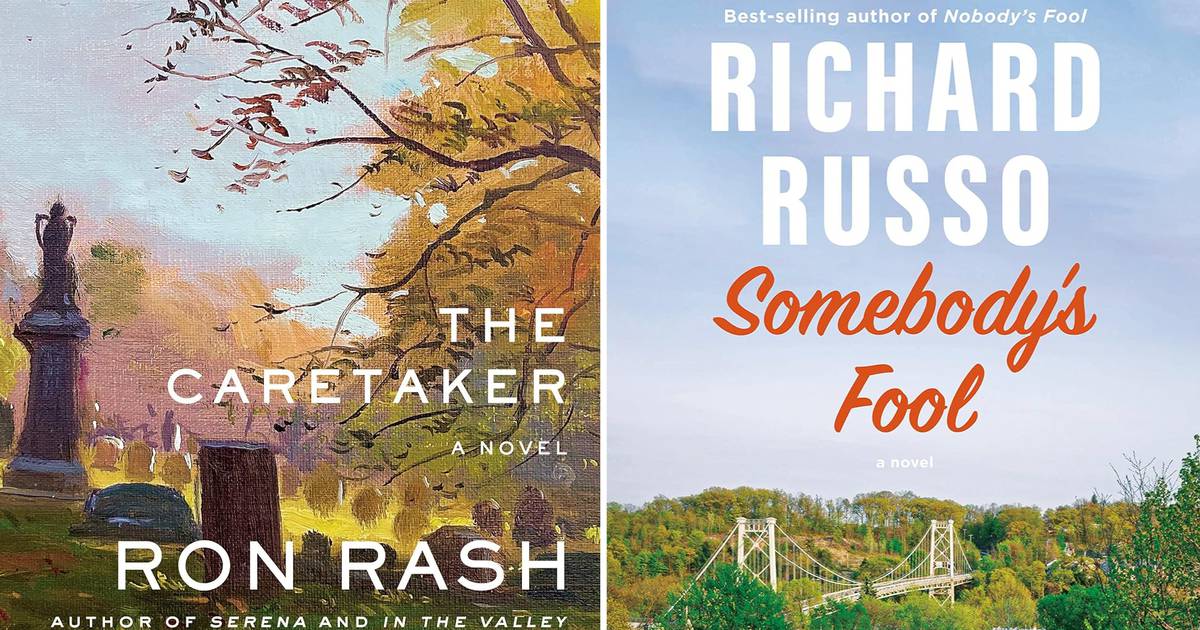
When thinking about what to read and then what to share here, I sometimes get trapped into believing it’s my job to seek out something new and unknown before returning to this space to share news of my explorations.
But sometimes I need a reminder of the pleasures of the kind of books that may not surprise you with their novelty, but that carry the resonance of experience when an author is working at the top of their game in territory they know well.
Reading recent books by Ron Rash (“The Caretaker”) and Richard Russo (“Somebody’s Fool”) back to back reminded me of these virtues.
In Russo’s case, “Somebody’s Fool” is his third trip to the town of Bath, Maine, following the previous installments of “Nobody’s Fool” and “Everybody’s Fool.” Donald “Sully” Sullivan, the central character of the first two novels, has died, leaving his son Peter behind to make sense not only of his own life, but of the lives of the people Sully has left in Peter’s care in one way or another.
“The Caretaker” has Rash in his usual milieu of the mid-20th century Western North Carolina mountains, a time and place he brings alive with spare and beautiful prose. The title refers to Blackburn Gant, the young man in charge of a hilltop cemetery following a bout of childhood polio that has left his face permanently disfigured. Gant has been tasked with looking after Naomi, the pregnant wife of his best (and only) friend Jacob after Jacob is drafted to serve in the Korean War. Jacob was alienated from the rest of the Hampton family for marrying Naomi, a local woman his parents believe is beneath the station of the town’s leading family.
When Jacob is wounded in war, the Hamptons see a chance to reset their son on the path they desired for him.
To say more is to spoil a page-turner of a plot, so I’ll say no more.
“Somebody’s Fool” unfolds at a more languid pace as we spend time with Peter as well as Raymer, the recently retired town police chief who is wondering if he still has use to anyone. Filling out the cast is Sully’s former lover Ruth and her daughter Janey, who are wondering if life has more to offer than simply enduring one trial after another. Russo’s wry humor and pleasure in exploiting human foibles for the sake of a story are on display throughout the novel.
What struck me, reading these books in rapid succession, is that despite being set in different places and different times and striking very different tones, they share some underlying universal, maybe even eternal themes.
They ask and through storytelling answer questions about what we owe to others in the world, the obligations we have to act on our own sense of humanity, even when, or maybe especially when, this is most difficult. That people are flawed is a given in both novels, but seeing how we have the potential to transcend our own flaws, even briefly, results in a powerful reading experience.
These authors have shown this in their books before, and returning to this sensation felt very reassuring, hopeful even. Hard things happen, but these hard things are survivable. We can offer others grace, should we choose.
These pleasures are like experiencing the day’s end from a familiar place, the kind of thing we may take for granted, even though maybe we shouldn’t. There may be no surprises in the sun’s slow descent, the bloom of colors across the sky, but there is a profound beauty in its reliable spectacle.
John Warner is the author of “Why They Can’t Write: Killing the Five-Paragraph Essay and Other Necessities.”
Twitter @biblioracle
Book recommendations from the Biblioracle
John Warner tells you what to read based on the last five books you’ve read.
1. “The Running Grave” by Robert Galbraith
2. “Hello Beautiful” by Ann Napolitano
3. “The Armor of Light” by Ken Follett
4. “Lady Tan’s Circle of Women” by Lisa See
5. “Demon Copperhead” by Barbara Kingsolver
— Pat B., Naperville
I think Angela Flournoy’s “The Turner House,” a multigenerational family story set in Detroit with a mystery at the center, will keep Pat’s attention.
1. “Moby-Dick” by Herman Melville
2. “The Way of the Bear” by Anne Hillerman
3. “Tess of the d’Urbervilles” by Thomas Hardy
4. “East of Eden” by John Steinbeck
5. “The Secret Hours” by Mick Herron
— Fred K., Oswego
Do I go classic, or do I go contemporary? How about a contemporary classic? “The Round House” by Louise Erdrich.
1. “Horse” by Geraldine Brooks
2. “Wilding: The Return of Nature to a British Farm” by Isabella Tree
3. “Kasher in the Rye: The True tale of a White Boy from Oakland Who Became a Drug Addict, Criminal, Mental Patient, and then Turned 16” By Moshe Kasher
4. “Mrs. Caliban” by Rachel Ingalls
5. “Lincoln in the Bardo” by George Saunders
— Lisa S., Lake Bluff
I have a hunch Lisa will have read my recommendation, but if so, she’ll email me and give me a mulligan. I’m recommending it anyway, because if not, it’s really the perfect book for her: “The Overstory” by Richard Powers.
Get a reading from the Biblioracle
Send a list of the last five books you’ve read and your hometown to [email protected].
